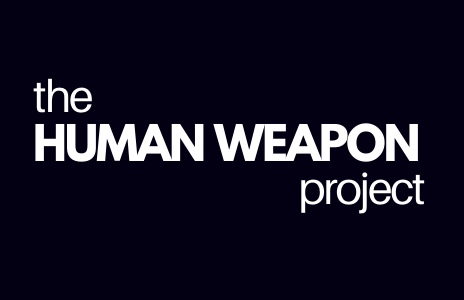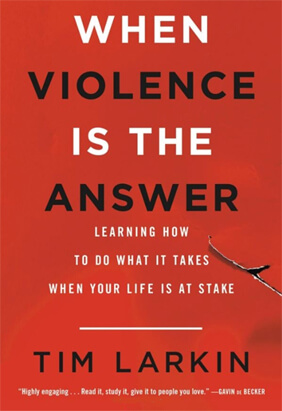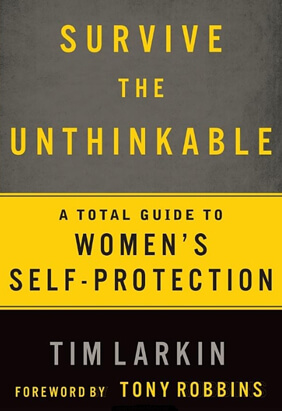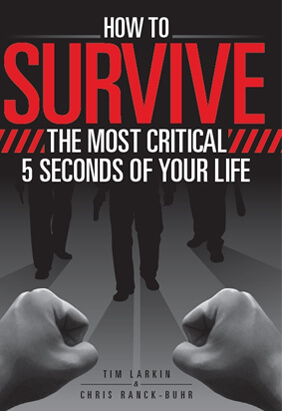
- timlarkin
SELF-DEFENSE TRUTH: WORRYING ABOUT LOSING WON’T MAKE YOU WIN
 “But what if he [INSERT AWFUL THING HERE]?”
“But what if he [INSERT AWFUL THING HERE]?”
I get asked this question all the time. It tells me a lot about the person asking it. “But what if…” tells me about a person’s frame of mind, and how they see themselves in violence. They’ve chosen second place, victimhood, with a wait-and-see attitude that makes them perfect prey for the best predators out there.
Now, this is not a conscious choice—they’re not “wrong” in an absolute sense—and it really speaks to how little violence we are subjected to across a lifetime. The average experience is zero to a handful of incidents, not nearly enough to draw operational conclusions. Our collective lack of experience shows what a nice reality-bubble we’ve created here in the First World.
Don’t get me wrong, it is nice; it just leaves us woefully unprepared when the rare, “black-swan” event of real violence intrudes.
A lot of time and money is spent figuring out how successful people think. In business, for example, it can be shown that there are modes of thought that routinely lead to ruin; closer to what we’re up to we can look to professional sports where the winners envision themselves doing the thing they wish to do, pushing away or minimizing doubt and worry, and then act purely to achieve that imagined goal.
Predatory sociopaths, especially those in prison due to society’s recognition of their success rate, thrive because they never see themselves as the victim in a violent exchange—only as the giver.
If you enter into such an interaction with your primary thought process being “what will happen to me?” then you are bringing along something that will impede your ability to succeed and win.
There’s nothing anyone can do about the biological facts of fear—the body’s response to danger and preparations to handle it (fight or flight) —but the psychological response to those preparations is under your control. Making worry a priority is a great way to kick off psychological panic. You want to use your body’s response to your advantage, not his. Train defensively and you train to help him do whatever it is you’re worried about.
If your primary concern is not getting hurt, well, I share your sentiment, but here’s another self-defense truth: That’s not really something you get to choose. Expect to get hit, thwacked, cut, shot. These things will happen whether you want them to or not. If we could choose not to have them happen, then believe me, we’d train them. We’d train the hell out of them. But it turns out the only thing you really have control of in violence is what you do to the other guy.
How do we train, then, for the best chance of operational success? Again, we can take our cues from professional athletes: worrying about losing does not make one win—worrying about winning does. Train for the result you want. Practice smashing targets.
It’s really that simple.
Trade out the worry for “How about if I do [INSERT AWFUL THING HERE].”
All Latest Posts
- WHATS MISSING IN ALL SELF PROTECTION TRAINING & WHY THE MEDIA LIKES IT THAT WAY
- SELF-DEFENSE AND FIGHT SCIENCE
- PREVENT VIOLENCE VS. DO VIOLENCE: PART I
- PREVENT VIOLENCE VS. DO VIOLENCE: PART II
- SELF DEFENSE TRAINING: KILLING WITH RULES
- SELF-DEFENSE: STOP FIGHTING AND DELIVER A BEATING
- SELF PROTECTION QUESTION: HOW CAN I JUSTIFY THE USE OF VIOLENCE?
- SELF-PROTECTION MENTALITY: I WAS PREOCCUPIED WITH WHAT I WAS GOING TO DO TO HIM
- FIRST STRIKE: HOW AND WHY YOU SHOULD LAND IT
- INTIMIDATION DURING SELF PROTECTION IS A SUCKER’S GAME
- ANTISOCIAL CONFRONTATION: AGGRESSIVE, BADASS OR DEADLY?
- DEBILITATING INJURY: HOW TO TAKE A PUNCH
- TARGET FOCUS TRAINING PRINCIPLES IN A NUTSHELL
- SELF PROTECTION LESSON: MOVE WITH THE INJURED MAN
- SELF-DEFENSE CLASSES: WHO HAS THE REAL KOOL-AID?
- THE “NUCLEAR OPTION” OF LIFE OR DEATH SELF-DEFENSE
- INJURY IS THE ONLY GOAL OF VIOLENCE
- WHEN IS IT TIME TO LEARN SELF-DEFENSE TECHNIQUE?
- La guía de autodefensa de un teleadicto y otras historias
- Ein Couch-Potato-Leitfaden zur Selbstverteidigung und andere Geschichten
- SELF DEFENSE FACT: FIGHTING IS HARD. HURTING PEOPLE IS EASY.
- THE OL’ ONE-TWO
- ANTI-SOCIAL AGGRESSION AND TRAGEDY ARE AVOIDABLE
- PERSONAL SELF-DEFENSE: THERE ARE NO “EASY” TARGETS
- SELF-DEFENSE LESSONS: YOU CAN’T WAVE AN INVISIBLE GUN
- ARE YOU AGGRESSIVE, BADASS, OR DEADLY?
- THE TARGET FOCUS TRAINING EXPERIENCE
- SELF-DEFENSE Q&A: WHERE DOES TFT FIT INTO LAW ENFORCEMENT?
- IS LETHAL FORCE SELF-DEFENSE USEFUL IN YOUR EVERYDAY LIFE?
- “But I Don’t Want to Kill Anyone!”
- “But What If He Flinches?”
- A Couch Potato’s Guide To Self Defense and Other Stories
- Why Not Just Buy a Gun?
- It’s a Nice Idea–But Does It Really Work?
- There’s only one way to train
- The Beating, the Breaking, or the Fall from a Great Height?
- Speed: The Last Thing You Need For Self-Defense
- Fighting Through Injury
- Targeting: Secret To Self Defense Success?
- Are You Learning To Fight… Or To Dance?
- Generación de máxima potencia
- Maximale Leistung erzeugen
- What Color Crayon Should I Use For A Ruptured Spleen?
- INJURY – The Only Goal Of Violence
- Violence as a Survival Tool
- Generating Maximum Power
- Social Confrontation vs Asocial Violence – Part 3
- Social Confrontation vs Asocial Violence – Part 2
- Social Confrontation vs Asocial Violence – Part 1
- Striking… TFT Style
- The Final Word in Context: MURDER
- Scenario Based Training Vs. The Hard Knot
- Time to Stop Lying to Yourself
- The Mindset to Survive and the Will to Win
- Training to “Wait and See”
- Access the Meat: Choosing the Level of Interaction in Violent Conflict
- Why Self-Defense is NOT Enough…
- SOCIAL OR ASOCIAL VIOLENCE – WHY BOTHER?
- THE ULTIMATE SELF-DEFENSE FIGHTING TECHNIQUE
- STRIKING – TFT STYLE
- ACCESS THE MEAT: CHOOSING THE LEVEL OF INTERACTION IN VIOLENT CONFLICT
- SELF DEFENSE IS NOT ENOUGH
- LEARN SELF DEFENSE: SHUT UP AND HURT HIM
- WINNING VIOLENCE: WOULD IT MATTER TO A SERIAL KILLER?
- DO SELF DEFENSE LESSONS LIKE TFT REALLY WORK?
- SELF-DEFENSE FACT: INJURY IS WHAT WORKS IN VIOLENCE
- SELF-DEFENSE TRUTH: WORRYING ABOUT LOSING WON’T MAKE YOU WIN
- LEARNING SELF-DEFENSE IS NOT ENOUGH
- PROTECT YOURSELF: BUILD A BETTER MONSTER
- LEARN SELF DEFENSE: THE DEFINITION OF VIOLENCE
- SELF DEFENSE QUESTION: ARE THERE ANY DOWNSIDES TO LIVING IN THE CAUSE STATE?
- A SELF DEFENSE TOOL IS JUST A TOOL
- SURVIVING THE AFTERMATH OF SELF-DEFENSE
- MULTIPLE ATTACKERS SELF-DEFENSE: PART THREE
- SELF PROTECTION: NATURE OR NURTURE?
- SELF DEFENSE AND YOUR EXPECTATIONS
- UNDERSTANDING VIOLENCE: FOUR LEVELS OF HUMAN INTERACTION
- WHY DO WE TEACH LETHAL SELF DEFENSE?
- SELF DEFENSE MINDSET: WHAT IS YOUR LIFE WORTH?
- BUT I DON’T WANT TO KILL ANYONE!
- SELF DEFENSE TRAINING VS. MMA TRAINING
- MULTIPLE ATTACKERS SELF DEFENSE: PART TWO
- ES IST EINE MÄNNER WELT… ODER WARUM ICH ES HASSE, FRAUEN ZU TRAINIEREN
- IMPACTANTE ESTUDIO REVELA QUE LA CONDICIÓN FÍSICA NO ES UN FACTOR CUANDO LUCHA POR SU VIDA
- CUANDO TU VIDA ESTÁ EN JUEGO, AQUÍ ES CÓMO JUGAR SEGÚN LAS REGLAS
- SCHOCKIERENDE STUDIE ZEIGT, DASS FITNESS KEIN FAKTOR IST, WENN UM IHR LEBEN KÄMPFT
- WENN IHR LEBEN AUF DEM SPIEL STEHT, SO SPIELEN SIE NACH DEN REGELN
- MANIOBRAS CORPORAL PARA EMPRESARIOS
- KÖRPERMANÖVER FÜR GESCHÄFTSLEUTE
- ES UN MUNDO DE HOMBRES… O POR QUÉ ODIO ENTRENAR MUJERES
- USING VIOLENCE: DEAD MEN TELL NO TALES
- MULTIPLE ATTACKERS SELF DEFENSE: PART ONE
- SLOW YOUR SELF PROTECTION TRAINING DOWN
- SELF DEFENSE TECHNIQUE: BUILD YOUR TARGET MAP
- SELF DEFENSE MOVES: KNOW HOW TO BREAK A NECK
- VIOLENCE & KISS (OR KILL IT SIMPLY, STUPID)
- SELF DEFENSE IS A SHAM • PART 2
- PRACTICING SELF DEFENSE: CAN BIGGER-STRONGER-FASTER MAKE A DIFFERENCE?
- THE BLUEPRINT FOR SUCCESS IN USING VIOLENCE
- SELF DEFENSE IS A SHAM • PART 1
- VIOLENCE STARTS AND ENDS WITH YOU
- FORGET FIGHTING. DELIVER AN INJURY.
- A FIREARM ISN’T EVERYTHING
- NAILING DOWN INTENT
- THE ANATOMY OF A SELF DEFENSE SEMINAR
- THE SELF DEFENSE PARADOX: IF YOU WANT A TRULY PEACEFUL LIFE, THEN TRAIN VIOLENCE.
- WHEN YOUR LIFE IS ON THE LINE, HERE’S HOW YOU PLAY BY THE RULES
- SHOCKING STUDY REVEALS FITNESS NOT A FACTOR WHEN FIGHTING FOR YOUR LIFE
- BODY MANEUVERS FOR BUSINESSMEN
- ITS A MAN’S WORLD… OR WHY I HATE TRAINING WOMEN









